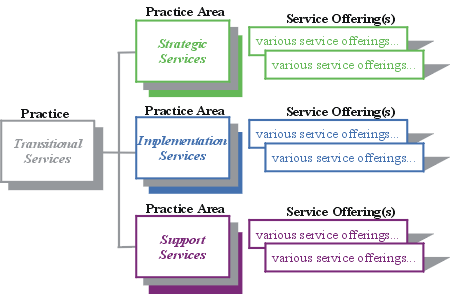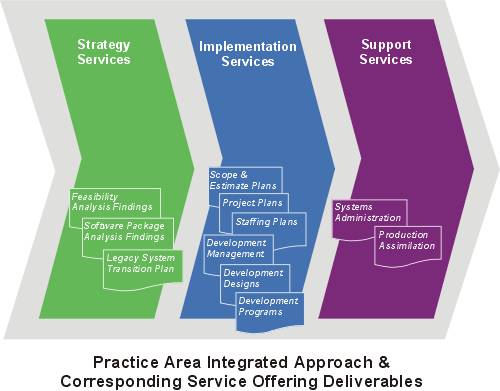|
| Transitional Services Practice |
|
Overview As seen in the graphic below, JEM Technology Group's Transitional Services Practice is comprised of three Practice Areas: Strategic Services, Implementation Services, and Support Services. Each area provides 'custom' solutions based upon the needs of our client's project. Also known as service offerings, the overall objective of these solutions is to provide an effective means for clients to smoothly transition from their old systems to their new, ERP solution. As previously stated, this practice is project or deliverable focused whereby our consultants are contracted to produce a specific deliverable depending upon our client's requirements. Finally, every Practice is comprised of numerous Practice Areas and for a specific Practice Area, there can be various Service Offering(s) as depicted and described below.
Strategic Services Current Systems Feasibility Study Defines the business processes to be supported by a new system, reviews the functional and technical strengths and weaknesses associated with the current system(s) as they relate to those business processes, and recommends an appropriate transition course of action (keep, replace, upgrade). This service offering is completed while modeling both the 'as is' the the 'to be' environments. Software Selection In the case where our client has decided to replace their current system with a software package, this service offering compares the business processes required by a new system to those offered by the various packages available in order to provide analysis into the strengths and weaknesses of each software package as it relates to our client's required business processes. Upon the completion of this FIT analysis, a recommendation for implementing a specific software package is given when appropriate. Enterprise System Transition Planning Given a decision by our client to replace a current system(s) with a specific software package, this service offering reviews the technical architecture of the current system and compares it to the technical architecture of the new system in order to identify the smoothest approach (or the legacy transition strategy) for moving required business data to the new system. When required, an approach to "cleanse" the data before populating the new system may also be defined.
Project Scoping and Estimating Given a company's legacy transition strategy, this service offering identifies the number of development objects (for example, the reports, interfaces, conversions, and enhancements-- also referred to as 'RICE' objects) required to support the new system being implemented. Once identified, each object's complexity is defined and a corresponding estimate is assigned. Project Planning Given the estimates assigned for each of the development objects, this service offering uses those estimates to develop a specific project plan tailored to the specific timelines and staffing requirements of our client. Project Staffing Using the completed project plan, this service offering identifies the types of skills required for each unique role defined to support the plan's implementation while considering our client's available staff and re-training objectives. Where our client is short on the number of resources required, we assist with locating, interviewing, and procuring the appropriate temporary resources.
Development Team Project Management Using the completed project plan and the resulting staff assigned, this service offering monitors the progress of the Development Team while managing the day to day activities associated with the ongoing design and development efforts. Object Design Given the specific tasks required to be completed by the Development Team, this service offering seeks to work in conjunction with project team's functional analysts to create the functional and technical designs required to program the needed development objects. Object Development Using the specific designs completed above, this service offering identifies logical groups of work that can be outsourced and completed by JEM Technology Group professionals, whether on-site or off-site.
Systems Administration Support Given the technical infrastructure required to support ERP implementations, this service offering provides any additional system hardware or software support required to ensure a successful transition. Skillset examples include the following: Database Administration, Network Administration, Hardware Configuration/Tuning, ERP Software Administration (for example, Basis), Operating System Administration, Security Administration, or Upgrade Support. Production Support After the new ERP solution has been implemented, this service offering provides the additional temporary skills required to ensure the new system is successfully assimilated into our client's environment. Examples of skills sometimes needed are system configuration, systems administration, development, or helpdesk management/support. Once the post go-live environment is stable, these responsibilities are gradually transferred to our client's personnel.
Typically, our clients find the benefits realized by working with the Transitional Services Practice allow them to derive the following:
|








